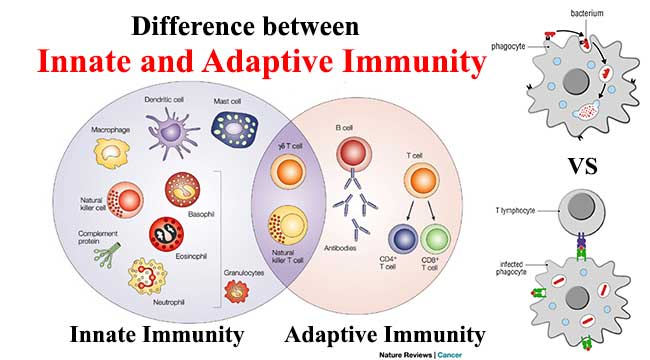| 1. | Presence | Innate immunity is something already present in the body. | Adaptive immunity is created in response to exposure to a foreign substance. |
| 2. | Specificity | Non-Specific | Specific |
| 3. | Response | Fights any foreign invader | Fight only specific infection |
| 4. | Response | Rapid | Slow (1-2 weeks) |
| 5. | Potency | Limited and Lower potency | High potency |
| 6. | Time span | Once activated against a specific type of antigen, the immunity remains throughout the life. | The span of developed immunity can be lifelong or short. |
| 7. | Inheritance | Innate type of immunity is generally inherited from parents and passed to offspring. | Adaptive immunity is not passed from the parents to offspring, hence it cannot be inherited. |
| 8. | Memory | Cannot react with equal potency upon repeated exposure to the same pathogen. | Adaptive system can remember the specific pathogens which have encountered before. |
| 9. | Presence | Present at birth | Develops during a person’s lifetime and can be short-lived. |
| 10. | Allergic Reaction | None | Immediate and Delay hypersensitivity |
| 11. | Used Against | For microbes | Microbes and non-microbial substances called antigens |
| 12. | Memory | No memory | Long term memory |
| 13. | Diversity | Limited | High |
| 14. | Speed | Faster response | Slower response |
| 15. | Complement system activation | Alternative and lectin pathways | Classical pathway |
| 16. | Anatomic and physiological barriers | Skin, Mucous membranes, Temp, pH, chemicals, etc. | Lymph nodes, spleen, mucosal associated lymphoid tissue. |
| 17. | Composition | The innate immune system is composed of physical and chemical barriers, phagocytic leukocytes, dendritic cells, natural killer cells, and plasma proteins. | Adaptive immune system is composed of B cells and T cells. |
| 18. | Development | Evolutionary, older and is found in both vertebrates and invertebrates. | Adaptive immunity system has been developed recently and is found only in the vertebrates. |
| 19. | Example | White blood cells fighting bacteria, causing redness and swelling, when you have a cut. | Chickenpox vaccination so that we don’t get chickenpox because adaptive immunity system has remembered the foreign body. |


I need clarification on the response state of active immunity and natural immunity to the antigen
what part oof the immune system is surpressed by immunosuppressants?
recognition mainly. then suppress proliferation
What happen if foreign invader attack the body to the second time in innate immunity ?
Because innate immunity doesn’t have memory to recall what happen to the body before, and how innate immunity will adapt that situation ? How innate immunity will response ?
Thankyou.
Innate doesn’t work over here again,the work goes straight to the T-cells which contains memory cells since its a known antigen
Pls Why All Immunoglublins Are Antibody But Ab Are Nt Ig
A foreign molecule that is specifically recognized by the host’s immune system as foreign or non self and is capable of triggering and immune response is called an immunogen. An Ag can specifically bind to an Ab molecule. An Ag i.e capable of producing an immune response is referred to as an immunogen. The term Ag, is used for a molecule i.e only capable of binding two an Ab molecule, but that does not necessarily induce an immune response. Therefore, all immunogens are considered as Ag, but not all Ags are immunogens.
What is the difference b/w artificial passive immunity and artificial active immunity
artificial passive immunity – Get the immunized cells from the immunized person
artificial active immunity – Getting immunized cells through the vaccination process
Why should de innate immune system have no memmory unlike de adaptive immune system?
In trying to answer, i would say innate is non-specific and that is the reason why it needs no memory the last invaded pathogen….. to bring you in understanding, if you know the data correctly they is no need to memorise but if you dont have that ability to know, that is when you can memorise….. in conclusion, it is non-specific that why it needs no memorise to recall what happened… it does not choose which pathogen to attack but all invaders to the body are attacked….thanks
I think memory cell formation involves the actions of certain T cell-secreted lymphokines. These are not found in the innate immune system.
We notice the same thing in T-cell independent B cell activation, where memory cells are not formed.
Basically, for memory cells to be formed, we need T-cells.
So I think it is due toghe absence of T cells in the innate system.
innate immune response is primary immune response and
adaptive immune response is secondary immune response
Does innate produce antibodies?
No, innate immunity doesn’t produce antibodies. Antibody is produce by adaptive immunity which have B cells.
But you can born with antibodies which have crossed the placenta from mother to foetus mostly IgG antibodies.
why is the innate said to have limited and lower potency when it is rapid in response?
can secondary immune response occur in innate immunity ??
Yes but (I think) it will be by the same type of antibody because the innate response doesn’t produce memory cells. It will be mostly ineffective against the same invader.
No
Bcz of the lack of memory in innate immune system
So upon the second exposure to a pathogen the innate will respond as if it is the first exposure , and this response can be effective or not depending on many factors .